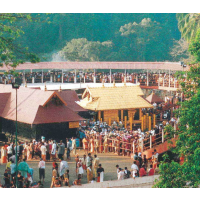In Face of Supreme Court Inquiry, Government Defends Banning of Women from Famed Temple
 Sabarimala Ayyappa temple (photo: Shankar, India Today Group, Getty Images)
Sabarimala Ayyappa temple (photo: Shankar, India Today Group, Getty Images)
By Rina Chandran
MUMBAI (Thomson Reuters Foundation) - Government authorities and temple officials in India's southern Kerala state are standing firmly by a decades-old tradition of banning women from one of the holiest Hindu temples after the nation's top court questioned the temple's right to bar women.
The Supreme Court has asked the Travancore Devaswom Board, which manages the famous Sabarimala Ayyappa temple, to clarify why it prohibited women from entering the shrine, saying this breached the nation's constitution.
The hilltop temple is one of a few in India which bars women of reproductive age, only allowing entry to girls aged under 10 and women over 50.
This ban came under legal scrutiny last week after the Young Lawyers' Association filed a petition seeking entry for all women but government officials defended the ban.
"This practice is going on for centuries," Home Minister Ramesh Chennithala told reporters in the Kerala capital of Thiruvananthapuram.
"The government will take a stand, going by the customs and traditions in the temple, and without hurting the sentiment of devotees."
Scores of women took to social media last November, joining a campaign launched as #happytobleed, after the head of the temple said he would consider allowing women to enter if there was a machine to check if they were menstruating.
In rural and urban India, menstruation is rarely discussed openly and menstrual blood is considered impure. In many communities, menstruating girls and women are not allowed to prepare food or enter a temple.
"The Board will implead in the case to protect the interests of the devotees," said Prayar Gopalakrishnan, president of the temple's board. "The divinity of the shrine comes from this custom. That will be protected at any cost."
An estimated one million Hindu pilgrims flock every year to the Sabarimala temple in the Western Ghats hills to pray to the deity Lord Ayyappan who meditated at that spot, according to Hindu mythology.
"The chief deity in the temple is a celibate. So allowing women to worship in the shrine is a sin," said the temple's chief priest Thazhamon Madom Kandararu Rajeevaru.
Temple Affairs Minister V.S. Sivakumar said the government "will protect the faith and custom" and file an affidavit in the Supreme Court on Jan. 18 in consultation with all stakeholders.
Additional reporting by D. Jose in Thiruvananthapuram and Suchitra Mohanty.
To Learn More:
Another Bollywood Bastion Falls to Women (AllGov India)
- Top Stories
- Controversies
- Where is the Money Going?
- India and the World
- Appointments and Resignations
- Unusual News
- Latest News
- India College Chain’s Expansion into U.S. Draws Opposition from Massachusetts Officials over Quality of Education
- Milk Shortages in India Tied to Release of New Movies Featuring Nation’s Favorite Stars
- Confusion Swirls around Kashmir Newspaper Ban in Wake of Violent Street Protests
- Polio-Free for 5 Years, India Launches Vaccine Drive after Polio Strain Discovery
- New Aviation Policy Could Increase Service, Lower Ticket Prices






Comments